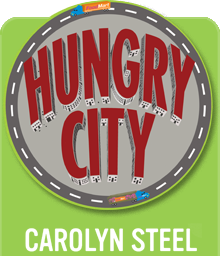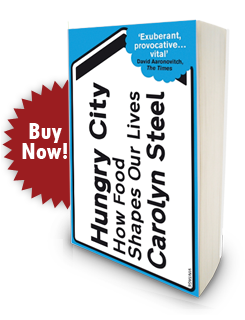Introduction
Listen to the podcast:
Hungry City is a book about how cities eat. That’s the quick definition. A slightly wordier one might that it’s about the eternal engine driving civilisation. Feeding cities arguably has a greater social and physical impact on us and our planet than anything else we do. Yet few of us in the West are conscious of the process. Food arrives on our plates as if by magic, and we rarely stop to wonder how it might have got there.
But when you think that every day for a city the size of London, enough food for thirty million meals must be produced, imported, sold, cooked, eaten and disposed of again, and that something similar must happen every day for every city on earth, it is remarkable that those of us living in cities get to eat at all. Food shapes cities, and through them, it moulds us – along with the countryside that feeds us. Every day we inhabit spaces food has made, unconsciously repeating actions as old as cities themselves. We might think that take-aways are a modern phenomenon, but 5,000 years ago, they lined the streets of Ur, one of the oldest cities on earth. Markets and shops, pubs and kitchens, diners and waste-dumps have always provided the backdrop to urban life.
Hungry City follows food’s journey from land to city, through market and supermarket, kitchen and table, waste-dump and back again, to show how food affects all our lives, and impacts on the planet. The final chapter asks how we might use food to re-think cities in the future – to design them and their hinterlands better, and live in them better too.











March 24th, 2009 at 4:41 pm
Hello
I am doing my diploma/MArch project all about food in the city of Leeds, neighbourhood of Richmond Hill. A third year recommended your book and it is WONDERFUL – has provided constant nourishment throughout. It sits by my studio desk, I dip into it every time I pause for a cuppa or my (increasingly arts tower based) meals… Thank you, this will stay with me forever – I know what you mean about your warped glasses!
Bea
February 1st, 2010 at 12:59 pm
Since your lecture on the hungry city (dec 2009) I saw the film The Power of Community – How Cuba survived Peak Oil. The film was shown at a local meeting of Transition Town Haren (NL). It showed how the Cuban people succeeded to overcome their lack of fossile fuel and to restore the fertlity of their soils to feed them all. Decentralisation and a high level of education for all, bringing sufficient food production back in control of the people, stimulated by private land ownership. The film is available on DVD via the above website. It showed me an example of SITOPIA.
June 18th, 2016 at 4:58 pm
It’s going to be end of mine day, however before ending I am
reading this impressive post to improve my know-how.